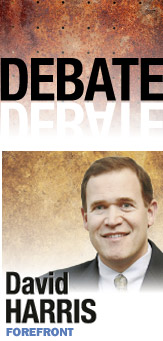Subscriber Benefit
As a subscriber you can listen to articles at work, in the car, or while you work out. Subscribe Now
 Question: Are teachers being scapegoated in the debate about improving schools?
Question: Are teachers being scapegoated in the debate about improving schools?
Answer: A consensus has emerged in this country that great teachers are the key to an excellent education. Research has found that having three great teachers in a row can overcome the effects of growing up in poverty.
That’s why the organization I lead, The Mind Trust, has invested over $4.5 million to bring top teacher programs like Teach For America, The New Teacher Project and Teach Plus to Indianapolis.
Because of the importance of teachers, leaders are embracing education policies that reward and retain the best teachers and dismiss the least-effective ones.
Unfortunately, some critics think teachers are being demeaned by the current education policy debate. President Obama and Gov. Daniels have been attacked as anti-teacher for advancing the types of policies described above.
Well-known education professor Diane Ravich wrote in The New York Times that the “Obama administration’s Race to the Top program took the attacks on teachers to a new level by encouraging states to evaluate teachers by their students’ test scores.”
Type “Mitch Daniels h” into Google and up pops “Mitch Daniels hates teachers.”
What accounts for this heated rhetoric?
Let’s examine what Obama and Daniels are advocating.
In March, the president said, “[i]t’s time to start rewarding good teachers, stop making excuses for bad ones … . Too many supporters of my party have resisted the idea of rewarding excellence in teaching, even though we know it can make a difference in the classroom.” Last September, the president told NBC that “if some teachers aren’t doing a good job, they’ve got to go.”
Early this year, Daniels said that “[o]ur best teachers should be paid more, much more, and ineffective teachers should be helped to improve or asked to move.”
Is there any profession where rewarding excellence and penalizing ineffectiveness is demeaning? Quite the contrary, it is the system education reformers are trying to change that demeans teachers.
As The New Teacher Project’s Tim Daly recently wrote in The New York Times, “Great teachers are among the most respected people in our society … [The problem is] that teaching is still based on a set of factory-era policies. … If you do a fantastic job in your classroom, you can’t expect a fast track up the career ladder … . You’ll get the same formulaic, seniority-based raise each year as the lower-performing teacher down the hall.”
Reformers want to elevate the teaching profession to its rightful place of high esteem in our society. The only way to do that is to fundamentally reorient the profession to value excellence and results.
Unfortunately, we are denied a robust debate on these issues because defenders of the status quo attack advocates of these reforms as anti-teacher.
Why? I suppose it is easier to obscure the issues by labeling reformers as “anti-teacher” than to defend a system that U.S. Education Secretary Arne Duncan says, “treats all teachers like interchangeable widgets” and values seniority more than effectiveness.
What is especially troubling about this tactic is that it denies us a chance to debate these critical issues. But it is hard to have that debate when the leaders who advocate these reforms are labeled anti-teacher.
So the next time someone says Obama or Daniels are anti-teacher, ask to which policies the critic objects. Ask the critic how he or she would change current policies that, as Duncan says, “were created over the past century to protect the rights of teachers but … have produced an industrial factory model of education.”
Let’s move away from the charge that anyone is scapegoating teachers and engage in a serious debate about how to elevate the teaching profession.•
__________
Harris is CEO of The Mind Trust, a not-for-profit supporting entrepreneurial education initiatives. Send comments on this column to [email protected].
Please enable JavaScript to view this content.
